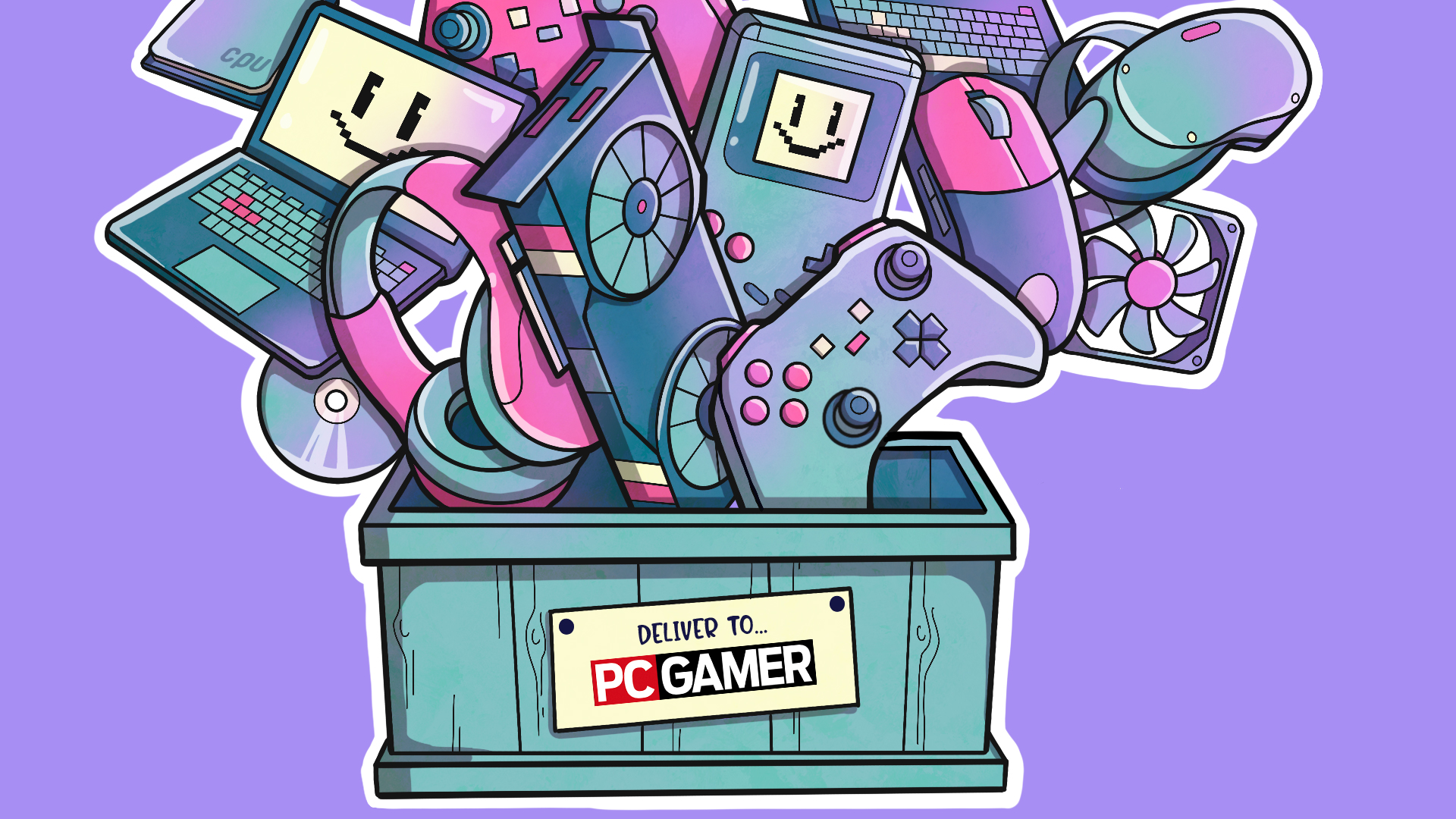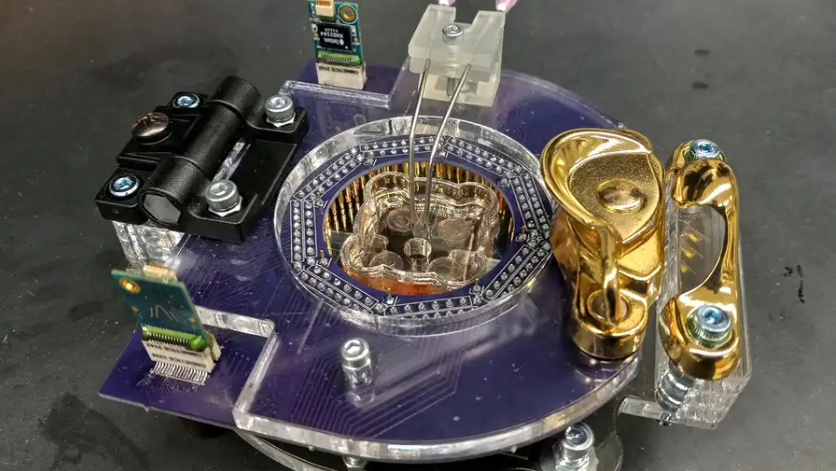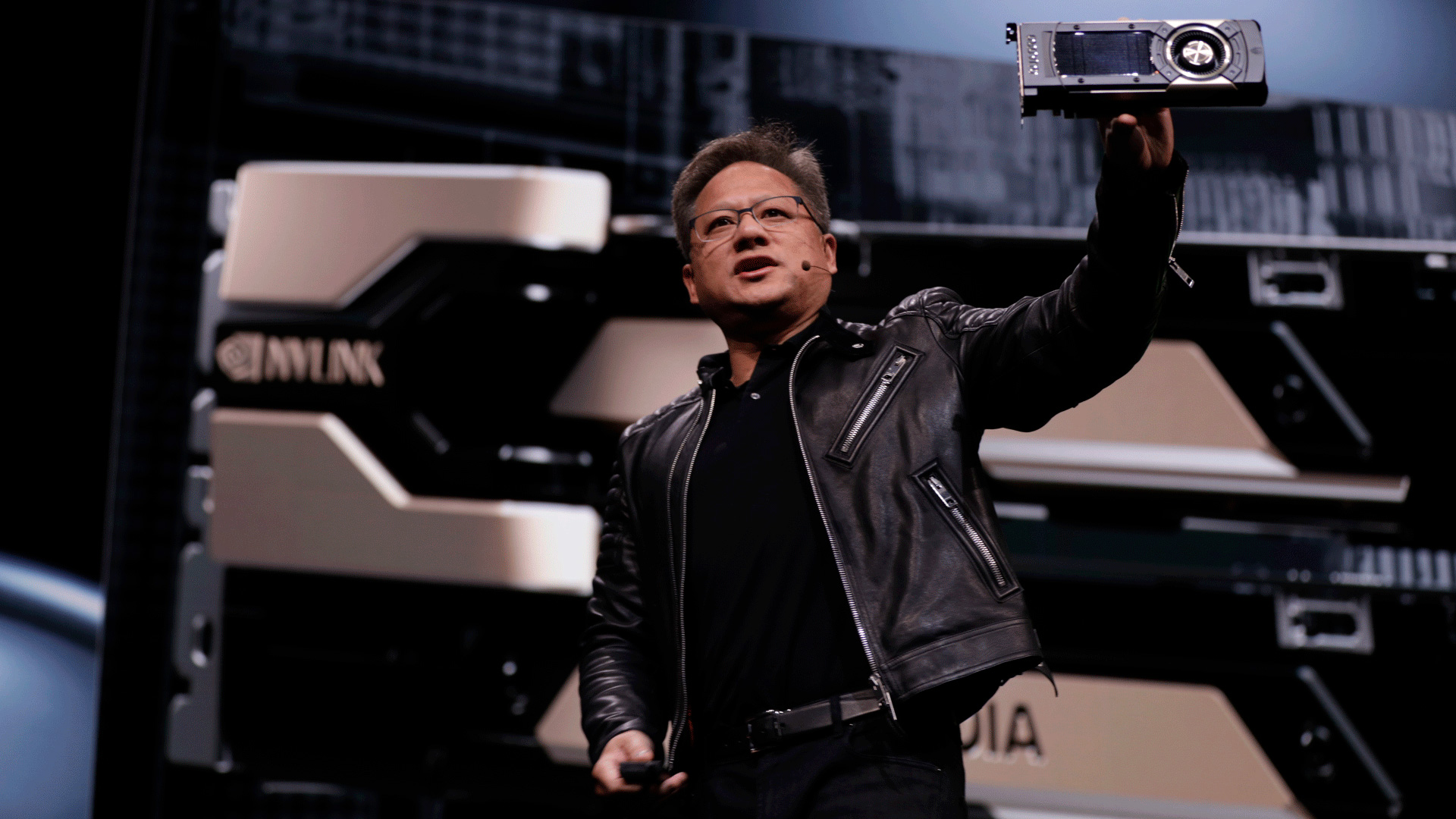PC Gamer's biggest hardware stories of 2023: AI wars, quantum lies, ray tracing magic, storage matters, and more
A journey across 12 months of news that you, our discerning readers, read the most often.

Well, we've made it. Another year has gone by and it's been as busy as ever, with constant changes in the world of PC hardware and software. So much has happened that it wouldn't make sense to try and cover it all in a single article, but we don't need to. That's because it's our readers who really determine what story is of the most interest and on that basis, I present you with an overview of 2023, from the perspective of which hardware stories you read the most often.
News from January to March

The top stories:
- We're one step closer to a meaty cyberpunk future as scientists create a 'living computer' using 80,000 mouse brain cells
- This person fully automated their $90K IT job and the boss still hasn't noticed
- This official D&D Lego set doubles as a fully playable gaming map
- Ultra-enthusiast hardware is strangling PC gaming
- Young workers don't know how to use office printers, scanners, ancient desktop PCs
- Someone really just created a gamer muzzle, didn't they?
- Seriously, where did you lot get the money for all those RTX 4090s?
- Where the heck do GPU prices go from here?
- First-person shooters have been getting perspective wrong all along
January is the time when many of us reflect on whether the new year will mark a change for us or if our resolutions will actually come true. Perhaps that's why the tale of an IT worker earning $90k to do almost no work, and get away with it, caught your attention so much. We couldn't verify how genuine the story was but it sounded awesome: Writing a script that automates the process of transferring documents and photos into cloud storage, then sitting back and letting that run all day long.
Perhaps a little too good to be true but it was still a heart warming tale to kick the year off! You were also very interested in reading about a D&D Lego set that worked as a fully playable gaming map, a wireless microphone that covers your entire mouth, and the nefarious world of sponsored links on Google.
The hope and optimism that a new year brings often fade in February, as people realise that it's a case of 'same thing, just a different number' and our top hardware stories of that month are evidence of this. Well, perhaps not but I'd say there was definitely a sense of agreement in discussions on how ultra-enthusiast hardware is strangling PC gaming and the alarming future of GPU prices.
But we all love a good oddball story or two, and a report on someone trying to cool their CPU using nothing more than an 8 pound chunk of copper was really popular. Maybe that's what we all wanted at the start of the year. More stories of people trying out something different or weird, even if it wasn't a success or just didn't make any sense.
Well, March provided the very answer to that conundrum because you all loved reading about a computer comprising 80,000 mouse brain cells and Stable Diffusion AI being used to convert brain waves into images. Or maybe it's just a case that folks are super keen on anything that points to a Cyberpunk future?
The biggest gaming news, reviews and hardware deals
Keep up to date with the most important stories and the best deals, as picked by the PC Gamer team.
That said, you also found news that young workers don't know how to use peripherals and PCs of the past and the fact that Diablo 4 would run on ten years old hardware to be just as interesting. Looks like we're not so focused on the future, after all.
News from April to June

The top stories:
- Iran's 'quantum processor' turned out to be a $600 dev board
- If you thought things couldn't get stupider, someone just held a CO2 reader up to a PC to prove 'bitcoin mining has zero carbon emissions'
- You've probably committed at least one of the 11 sins of PC building
- Starfield partners with AMD and oh boy, the internet is not happy
- Why you should consider a CRT for your PC gaming setup this year
- If you're planning to upgrade to an ultrawide gaming monitor, don't overlook the one critical mistake I made
- You know M.2 SSDs suck, right?
- I just learned what modem means. My whole life has been a lie
- I was going to rant about film grain in games but then I remembered chromatic aberration exists
Ah, spring: A time of rebirth, growth, and sunny skies. Well for those in the Northern hemisphere, at least, but it's still the time when things usually start to pick up in the world of PC hardware. Except this year it was a little quieter than usual (even though we reviewed a lot of products). By far the standout tale of April was news of a bitcoin firm claiming that its cryptominers had zero carbon emissions, by waving a carbon dioxide sensor about a PC as means of proof.
It wasn't an April Fool's joke, either. You were all just as amused and perplexed as we were! And you shared our same views on chromatic aberration in games and loved the look of the original Half Life modded to use ray tracing.
Shared viewpoints and opinions was very much the theme for May and you joined in the hundreds of thousands to read about how to build a gaming PC properly, what to do when switching to an ultrawide monitor, and why M.2 SSDs aren't actually very good. That's the joy of being a PC gamer: There are millions of us out there and it's a vast experience pool to dip into and share knowledge with.
June was a quirky month for news and features. Your absolute favourite was the report on a quantum processor, allegedly designed and built by Iran's military. I say quantum processor but it was actually a dual-core ARM Cortex-A9 chip. Hmm, just a slight exaggeration, then. You were also enamoured by the news of AMD's exclusive partnership with Bethesda for Starfield and how you should be using a CRT monitor in your gaming setup.
We all know how Starfield eventually turned out, of course, and its performance wasn't great, even with a high-end AMD setup. PC games this year had a bit of an issue with running well, namely the big AAA ones released on multiple platforms. I suspect that we'll be seeing more of the same in 2024 but all of us at PC Gamer will be more than happy if the opposite actually happens.
News from July to September

The top stories:
- I've tested Nvidia's latest ray tracing magic in Cyberpunk 2077 and it's a no-brainer: at worst it's just better-looking, at best it's that and a whole lot more performance
- ULTRARAM may be a silly name but it's the holy grail for memory tech and means your PC could hibernate for over 1,000 years
- Microsoft's light-based computer marks 'the unravelling of Moore's Law'
- Nvidia announces 'the most powerful single slot GPU on the planet' but it's a workstation card so naturally costs $1,250
- A simple Windows 11 shortcut has changed my view of PC HDR gaming: Win+Alt+B
- A $5 Starfield mod to enable DLSS Frame Generation has been cracked to remove modder's DRM
- That 4K 32-inch OLED gaming monitor you've been waiting for will finally arrive in summer 2024
- I just found out what Wi-Fi means and it's sending me
- Thousands of 1980s PCs lived happily in a barn for 33 years and are now being sold for $120 a pop so you can relive the birth of PC gaming and the internet yourself
The second half of 2023 kicked off in a similar theme as to how the first half ended: A broad mixture of topics captured your attention, with Intel's light-based processor being the biggest story of July. We're all curious to know what the future of PC technology is going to be like, as we've been used to seeing big jumps in performance over the decades. These days the increase with each generation is a lot smaller so any news of a chance to pick things back up again is always going to be of interest.
We learned more on AMD's compact Zen 4c architecture in the same month, along with what Wi-Fi actually stands for, and that for nearly $700, you can attach an external GPU to a Steam Deck for a decent boost in rendering performance. I'm not sure if you all thought the last one was good news or not, but I suspect a good many of you had the same reaction as us: How much?
PC tech was big news in August, with 'big' being the key word here. Like memory that can store data for 1,000 years and $1,250 for a single slot GPU. One step forward, one step backward I guess. Fortunately, progress is healthy elsewhere, with reports on AMD's Zen 5 CPU design and lovely 4K OLED monitors all pointing to a PC gaming future packed with fast frame rates and glorious colours.
Not traditional feel-good stories, I grant you, but us PC gamers do love a nice tech tale or two.
The future of PC gaming was also at the heart of the biggest stories in September. Our hardware overlord Dave gave us the skinny on Nvidia's ray reconstruction in Cyberpunk 2077 and it's clearly going to be something we'll be seeing a lot more next year. But that good news was tempered by a look at Apple's new iPhone chip and what it means for future GPUs.
Perhaps the most compelling story of what might be big in 2024 was news of a $5 mod for Starfield that enabled DLSS Frame Generation. Well, the actual story was on how its DRM had been bypassed, but to me it shows that PC gamers no longer have to wait for developers to sort out missing features. The community will do it for them.
Arguably, that's not a feel-good story as it raised debate over whether mods should be free or not, and that the customer shouldn't be expected to fix something that they've bought. I do think that this is something we'll be reading a lot more about next year, though, and that alone is newsworthy in its own right.
News from October to December

The top stories:
- US gov fires a warning shot at Nvidia: 'We cannot let China get these chips... If you redesign a chip that enables them to do AI, I'm going to control it the very next day'
- Windows 11 has been shrunk to a 3.3GB install size but even the developer believes you should think twice before installing it
- For years I believed Windows to be making up problems with my removable drives. Turns out I'm the problem
- SteamOS will be coming to other handhelds before you can install it on your PC 'because right now, it's very, very tuned for Steam Deck'
- There's no technical reason Rockstar can give for why a PC version of GTA 6 isn't arriving with the console release
- Samsung's monster-sized Ark gaming monitor gets a refresh and for a mere $3000, you too can hook up four PCs to the same screen
- Sorry Apple, turns out 8GB of memory on a Mac isn't anything like 16GB on a PC after all
- You know SSDs are super cheap at the moment, right? These are the good times, but as production gets cut chip prices will rise
- Alienware built a gigantic 16-foot mechanical keyboard and mouse then convinced a Dota 2 esports team to actually use it
2023 closed with two monumental stories, the first of which being a report in October on the developers of Tiny11 creating a version of Windows 11 that needs just 3.3GB of drive space. That detail certainly caught your attention but I wonder if it was more because the software team actually recommended that it was best if you didn't use it. Maybe PC gamers just don't like being told what they can't do!
You also enjoyed reading about Jacob's woes with Windows and removable drives, the current prices of SSDs, and my apparent hypocrisy for criticising current GPUs, despite buying one of the more egregiously overpriced ones.
November was a nice mixture of stories, with a report on the possibility of SteamOS being on other handhelds, a $3000 gaming monitor, and a fully working 16-foot keyboard and mouse being the biggest hits. Literally, in the case of the latter. Heaven only knows what the input latency was like on them but I bet it was lots of fun to use them.
The year ended with our biggest hardware story, one that pulled in an enormous number of readers. And it was a story that's likely to run into 2024 and still top the headlines. The US government was basically very unhappy with Nvidia modifying its chips, so it could still sell them in China. That restriction had come about because the same office had implemented an export ban on anything that could be used to do high-end compute or AI work.
It's arguably a little odd to expect a multi-billion dollar company to not try and sell its products in one the largest markets in the world, but Nvidia is one business that's not exactly flavour of the month (well, year) with PC gamers. So I suspect there was a fair degree of schadenfreude going on with that report!
The announcement trailer for GTA 6 was big news in December, of course, but for us it was the disappointment that, once again, Rockstar left out any details about the PC version. There's no technical reason for this, it was simply a marketing/financial decision.
Kinda like the report on someone checking Apple's claims that 8GB on MacOS was just as good as 16GB in Windows. We all knew it wasn't and that it's just marketing nonsense but it was still good to see no matter what claims a vendor will make, there will always be somebody to check them out!

Nick, gaming, and computers all first met in 1981, with the love affair starting on a Sinclair ZX81 in kit form and a book on ZX Basic. He ended up becoming a physics and IT teacher, but by the late 1990s decided it was time to cut his teeth writing for a long defunct UK tech site. He went on to do the same at Madonion, helping to write the help files for 3DMark and PCMark. After a short stint working at Beyond3D.com, Nick joined Futuremark (MadOnion rebranded) full-time, as editor-in-chief for its gaming and hardware section, YouGamers. After the site shutdown, he became an engineering and computing lecturer for many years, but missed the writing bug. Cue four years at TechSpot.com and over 100 long articles on anything and everything. He freely admits to being far too obsessed with GPUs and open world grindy RPGs, but who isn't these days?

